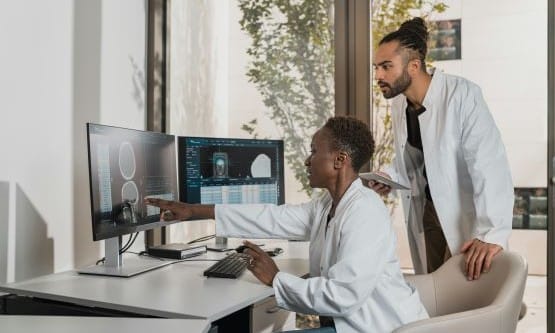Radiologists ‘face battery hen future’
- 12 June 2013

Outsourcing powered by technology will be the death of radiology as we know it in this country, a debate at UKRC concluded.
After hearing impassioned arguments on both sides of the issue, the audience swung around to favour the view that radiology as it is currently practiced will be killed off by outsourcing.
Proposing the motion, Dr Nicola Strickland, consultant radiologist at Imperial College Healthcare NHS Trust in London, foresaw a gloomy future for the profession.
She sketched out a vision of radiologists caged up like battery hens, doing reporting remotely from any clinical base.
"I want to see happy radiologists interacting with their colleagues, actually acting as doctors, and providing clinical consultation on site," she said.
She warned that outsourcing could lead to a "race to the bottom" on price and foresaw a situation in which the lowest bidder would invariably get a study to report.
Other effects of outsourcing might include no job security for radiologists, no system for training juniors, and a profession divorced from the clinical process, she added.
Dr Strickland urged colleagues to beware teleradiologists who recommend more tests, don’t take part in multi-disciplinary team meetings, don’t hold the FRCR qualification, speak English poorly, don’t have to revalidate with the GMC, work for low rates, are immune to the British legal system because they work abroad, and may even have been struck off in their own country.
She argued that the solution to overloads in radiology departments lay with in-sourcing within regions.
Spirited opposition to the motion came from Dr Don Collie, managing director of Expert Eye and a consultant radiologist in Fife.
He said he disliked the term outsourcing and believed the independent sector could help with the high workload being generated in hospitals.
He said that he regularly saw district general hospitals with 300 MRI scans in their backlog waiting for reporting. He did not recognise the profile of people described by Dr Strickland; his company used British radiologists.
Dr Collie said the independent sector had dedicated teleradiology platforms to deal with the volumes of work from different sources.
In addition, investment was being made into features such as real- time online case discussion, web-based referrer imaging and report access and capacity demand management.
"The NHS does not have the ability to work on an inter-enterprise basis," he argued.
This was precisely what the independent sector provided with more productive radiologists in a better environment, he said.
Dr Collie acknowledged the need for the independent sector to involved in training juniors and said teleradiology should be taught too. "It’s going to be part of your practice in the future."
A radiologist in the audience contrasted working from home with slow unresponsive NHS technology with a far faster solution provided by a teleradiology firm.
A trainee radiologist said outsourcing could potentially be catastrophic for training as there was no profit in it. A tutor asked how radiologists could be trained if all reporting was done outside the NHS.
In the final count, 56% of the audience at the conference in Liverpool supported the motion; while 44% voted against.



